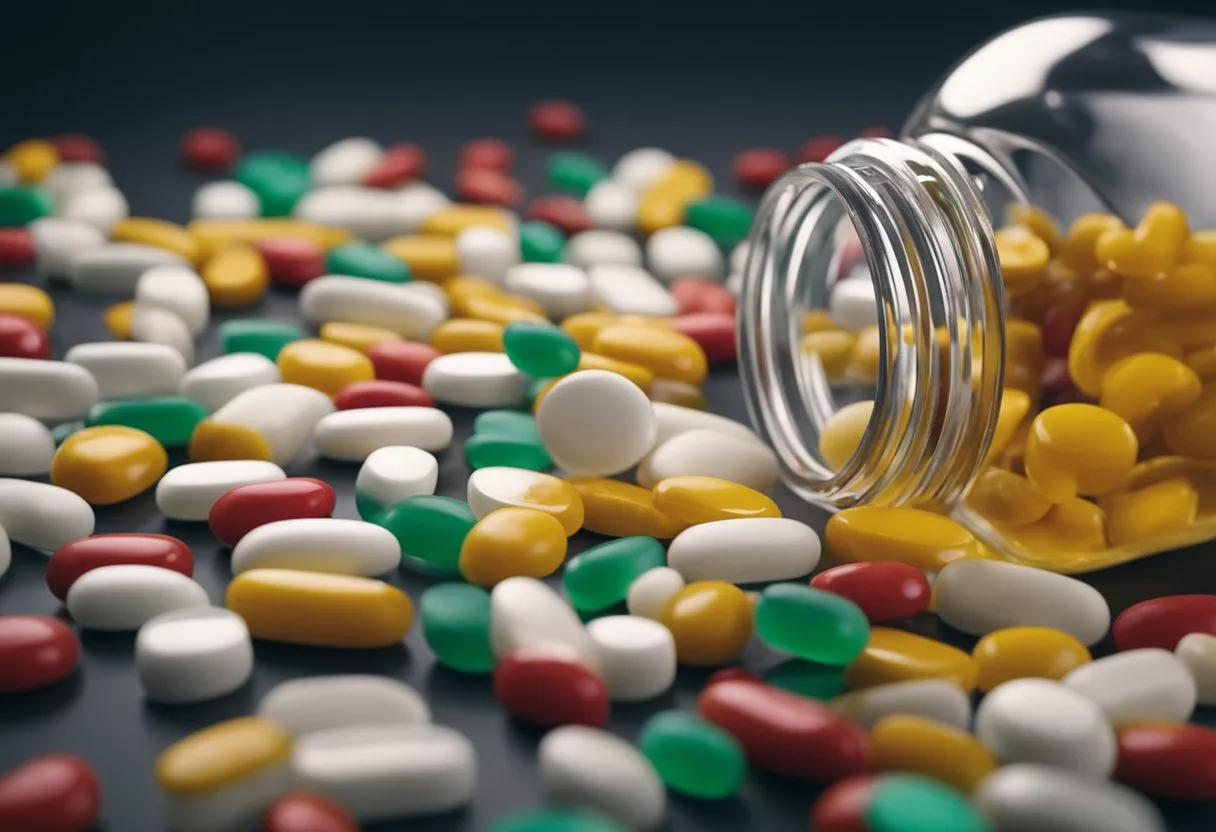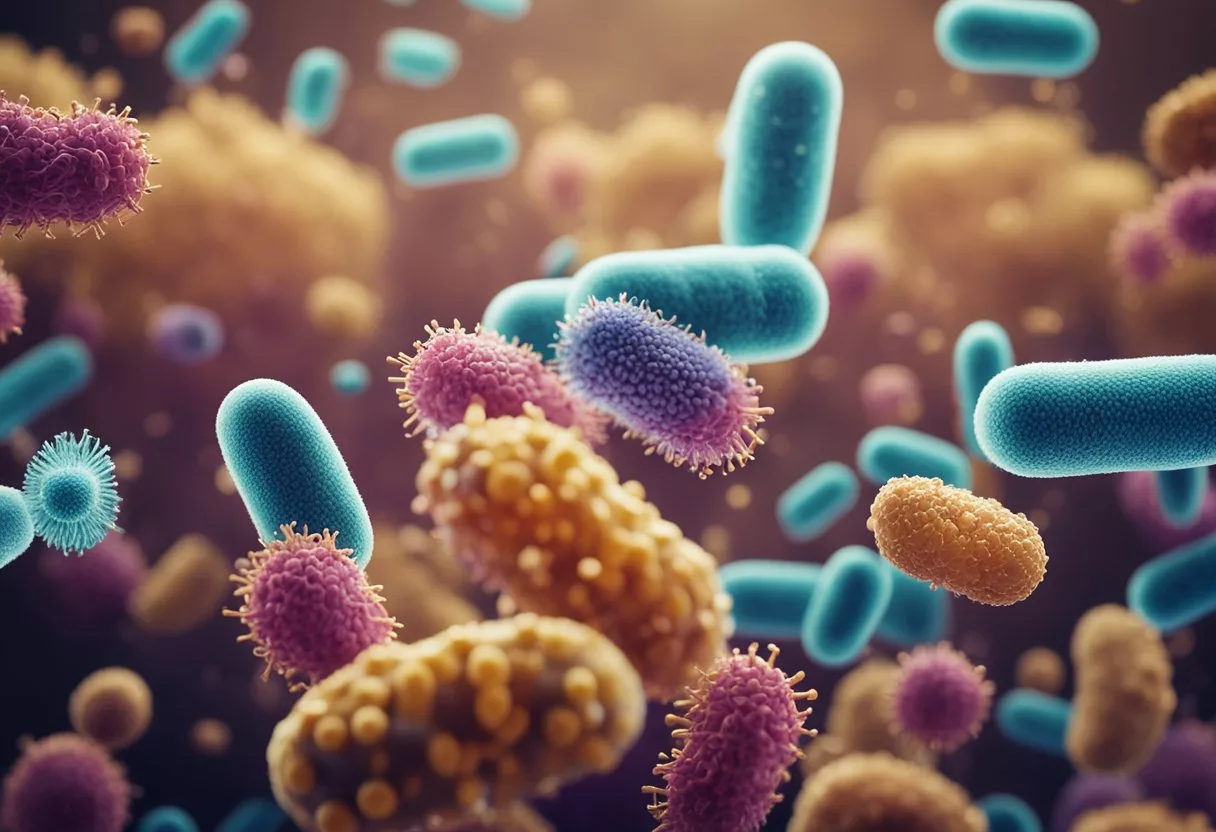Antibiotics are powerful medications that fight bacterial infections. When used correctly, they can save lives. But taking too many antibiotics can harm your body in unexpected ways.

Taking too many antibiotics can disrupt your gut microbiome, increase antibiotic resistance, and cause side effects like nausea, diarrhea, and allergic reactions. The trillions of bacteria in your intestines play important roles in digestion and immunity. Overusing antibiotics can kill off good bacteria along with the bad.
Antibiotic resistance is a growing problem worldwide. When bacteria become resistant to antibiotics, infections become harder to treat. This makes it crucial to use antibiotics only when truly needed. Understanding the risks can help people make smart choices about antibiotic use.
Key Takeaways
- Antibiotics can disrupt the gut microbiome and increase antibiotic resistance
- Proper use of antibiotics is essential for treating bacterial infections effectively
- Patients should follow doctor’s instructions carefully when taking antibiotics
Understanding Antibiotics

Antibiotics are medicines used to fight bacterial infections. They work by killing bacteria or stopping them from growing and spreading.
Doctors prescribe antibiotics to treat many common illnesses. These include strep throat, pneumonia, and urinary tract infections.
It’s important to know that antibiotics only work against bacteria. They don’t help with viral infections like colds or the flu.
Taking antibiotics when you don’t need them can be harmful. It can lead to antibiotic resistance, which means bacteria become harder to kill.
There are different types of antibiotics:
- Penicillins
- Cephalosporins
- Macrolides
- Fluoroquinolones
- Tetracyclines
Each type works best for certain bacterial infections. Your doctor will choose the right one for you.
Always take antibiotics exactly as prescribed. Finish the full course, even if you feel better. This helps prevent antibiotic resistance.
The CDC recommends using antibiotics only when necessary. This helps keep them effective for future use.
Side effects of antibiotics can include:
- Nausea
- Diarrhea
- Rash
- Yeast infections
If you have severe side effects, call your doctor right away. They may need to change your treatment.
The Role of Antibiotics in Treating Infections
Antibiotics play a crucial role in fighting bacterial infections. They work by killing bacteria or stopping their growth. Many antibiotics can successfully treat infections caused by bacteria.
Distinguishing Between Bacterial and Viral Infections
Doctors must determine if an infection is bacterial or viral before prescribing antibiotics. Bacterial infections often cause symptoms like fever, swollen lymph nodes, and pus. Viral infections typically cause runny noses, coughs, and body aches.
Strep throat is a common bacterial infection. It causes severe sore throat, fever, and swollen tonsils. The flu, on the other hand, is viral. It leads to fatigue, body aches, and respiratory symptoms.
Bacterial sinus infections may require antibiotics if symptoms last over 10 days. Viral sinus infections usually clear up on their own in a week or two.
Common Infections Treated with Antibiotics
Antibiotics treat many types of bacterial infections. Urinary tract infections (UTIs) often need antibiotic treatment. Symptoms include burning while urinating and frequent urges to urinate.
Doctors prescribe antibiotics for bacterial ear infections, especially in young children. These infections can cause ear pain and fever.
Skin infections like cellulitis may require oral or topical antibiotics. Signs include redness, swelling, and warmth in the affected area.
Kidney infections and pneumonia are serious conditions that often need antibiotic treatment. Both can cause high fever, chills, and body aches. Pneumonia also leads to coughing and breathing difficulties.
Adverse Effects of Antibiotic Overuse

Taking too many antibiotics can lead to serious health problems. The body may react negatively to excessive antibiotic use, causing various side effects and long-term issues.
Allergic Reactions to Antibiotics
Some people may develop allergic reactions to antibiotics. These reactions can range from mild to severe. Common symptoms include:
- Skin rashes
- Itching
- Hives
- Swelling of the face, tongue, or throat
In rare cases, a person might experience anaphylaxis, a life-threatening allergic reaction. This requires immediate medical attention.
Repeated exposure to antibiotics can increase the risk of developing an allergy. Health care providers should be informed of any previous allergic reactions to medications.
Gastrointestinal Complications
Antibiotics can disrupt the gut microbiome, leading to various digestive issues. Common problems include:
- Nausea and vomiting
- Diarrhea
- Abdominal pain
- Loss of appetite
In some cases, antibiotic use can lead to a Clostridium difficile (C. diff) infection. This causes severe diarrhea and can be life-threatening if left untreated.
Yeast infections may also occur due to the disruption of normal gut flora. Women may experience vaginal yeast infections, while both men and women can develop oral thrush.
Antibiotic-Resistant Bacteria Emergence
One of the most serious consequences of antibiotic overuse is the development of antibiotic-resistant bacteria. This occurs when bacteria evolve to survive antibiotic treatments.
Antibiotic-resistant infections are harder to treat and can lead to:
- Longer hospital stays
- Higher medical costs
- Increased risk of complications
Common antibiotic-resistant bacteria include:
- Methicillin-resistant Staphylococcus aureus (MRSA)
- Carbapenem-resistant Enterobacteriaceae (CRE)
- Multidrug-resistant tuberculosis (MDR-TB)
To prevent the spread of antibiotic-resistant bacteria, it’s crucial to use antibiotics only when necessary and as prescribed by a healthcare professional.
Impact on the Gut Microbiome

Taking too many antibiotics can significantly affect the gut microbiome. The gut microbiome is made up of trillions of microorganisms living in the digestive tract.
Antibiotics don’t just target harmful bacteria. They also kill beneficial bacteria in the gut. This can disrupt the balance of the microbiome.
The loss of good bacteria can lead to various digestive problems. These may include:
- Diarrhea
- Constipation
- Bloating
- Nausea
Antibiotics can cause rapid changes in gut flora. They may reduce the diversity of bacteria species present. This can impact digestion and nutrient absorption.
The gut microbiome plays a key role in immune function. Disrupting it with antibiotics may weaken the immune system temporarily.
Some bacteria species may become more resistant to antibiotics over time. This can lead to an overgrowth of antibiotic-resistant bacteria in the gut.
Restoring balance to the gut microbiome after antibiotic use takes time. Eating fiber-rich foods and taking probiotics may help support recovery of gut bacteria.
Consequences for Specific Populations

Taking too many antibiotics can affect certain groups more severely. These effects depend on a person’s health status and life stage.
Impact on Pregnant Women
Pregnant women face unique risks from antibiotic overuse. Some antibiotics can cross the placenta and harm the growing fetus. Others may increase the risk of birth defects.
Antibiotic use during pregnancy can also alter the baby’s gut bacteria. This may lead to health issues later in life. Pregnant women should only take antibiotics when needed and under a doctor’s care.
Certain antibiotics can cause:
- Teeth staining in the baby
- Liver problems
- Ear problems
Individuals with Pre-existing Conditions
People with some health issues need extra care with antibiotics. Those with asthma may have worse symptoms if they take too many. Patients with weak immune systems face a higher risk of side effects.
Antibiotic overuse can lead to more health problems:
- Kidney damage
- Liver issues
- Hearing loss
People with pre-existing conditions should talk to their doctor about antibiotic use. They may need special doses or types of antibiotics. Rest and other treatments may work better for some issues.
Women prone to yeast infections should be careful. Antibiotics can kill good bacteria and lead to more vaginal yeast infections.
Navigating Antibiotic Treatment

Taking antibiotics safely requires careful guidance from healthcare professionals. Proper use depends on factors like medical history and potential drug interactions.
Role of Healthcare Providers in Prescribing Antibiotics
Doctors play a key role in prescribing the right antibiotic. They consider the type of infection and choose an appropriate medication. Doctors also determine the correct dosage and duration of treatment.
Pharmacists provide important information about taking antibiotics correctly. They explain how to take the medication and potential side effects to watch for.
Healthcare providers help prevent antibiotic resistance by only prescribing antibiotics when necessary. They may recommend alternatives for viral infections that don’t respond to antibiotics.
Importance of Medical History and Drug Interactions
A patient’s medical history is important for safe antibiotic use. Doctors review past infections, treatments, and outcomes. This helps them choose effective antibiotics and avoid repeat prescriptions that may lead to resistance.
Allergies are a critical factor. Patients must inform their doctor of any known antibiotic allergies to prevent serious reactions.
Drug interactions can affect how antibiotics work. Patients should tell their doctor about all medications they take, including:
- Prescription drugs
- Over-the-counter medicines
- Vitamins and supplements
This information helps avoid harmful drug combinations and ensures the antibiotic will be effective.
Preventing Antibiotic Misuse

Taking antibiotics responsibly is key to avoiding harmful effects on your body. Smart use of these medicines helps keep you healthy and stops bacteria from becoming resistant.
Guidelines for Responsible Antibiotic Use
Only take antibiotics when your doctor says you need them. Don’t use old pills or ones meant for someone else. Always finish the full course as prescribed.
Ask your doctor if antibiotics are really needed. Many illnesses, like colds and flu, are caused by viruses. Antibiotics don’t work on these.
Overusing antibiotics can harm your body’s defenses. This makes it easier to get sick again later.
Don’t drink alcohol while taking antibiotics. Some types, like metronidazole, can cause bad reactions.
Be extra careful with strong antibiotics like fluoroquinolones. They can have serious side effects.
Alternatives to Antibiotics
For minor infections, your body often heals on its own. Rest and fluids help you recover faster.
Probiotics support your gut health. They may help prevent issues like C. difficile infection.
Some herbs have germ-fighting power. Garlic and oregano oil might help with certain infections.
Honey can soothe sore throats. It also fights bacteria in some cases.
Good hygiene stops germs from spreading. Wash your hands often to avoid getting sick.
Vaccines prevent many diseases. Staying up-to-date on shots keeps you and others healthy.
Frequently Asked Questions

Excessive antibiotic use can lead to various health issues. Understanding the risks and safe usage guidelines is crucial for maintaining overall health and preventing antibiotic resistance.
What are the potential side effects of taking antibiotics excessively?
Taking too many antibiotics can cause several side effects. These may include upset stomach, diarrhea, and yeast infections. Some people might experience allergic reactions or skin rashes.
Overuse can also lead to antibiotic resistance, making future infections harder to treat.
Can overuse of antibiotics lead to weakened immune function?
Yes, excessive antibiotic use can weaken the immune system. Antibiotics can disrupt the gut microbiome, which plays a key role in immune function.
This disruption can make a person more prone to infections and other health issues.
What signs should one look for to indicate an overdose of antibiotics?
Signs of antibiotic overdose include severe diarrhea, stomach pain, and nausea. Other symptoms may be fever, rash, or difficulty breathing.
If these symptoms occur, it’s important to seek medical help right away.
How frequently is it safe to use antibiotics within a year?
There’s no set number of times it’s safe to use antibiotics in a year. The frequency depends on individual health needs and doctor recommendations.
Antibiotics should only be used when prescribed by a healthcare professional for bacterial infections.
What are the long-term health impacts of repeated antibiotic use?
Long-term antibiotic use can lead to antibiotic resistance. This makes it harder to treat future infections.
It can also cause lasting changes to gut bacteria, potentially affecting digestion and overall health.
Is it harmful to consume antibiotics in the absence of an infection?
Yes, taking antibiotics without an infection is harmful. It can lead to antibiotic resistance and disrupt the body’s natural bacteria balance.
Unnecessary antibiotic use may also increase the risk of future infections and other health problems.